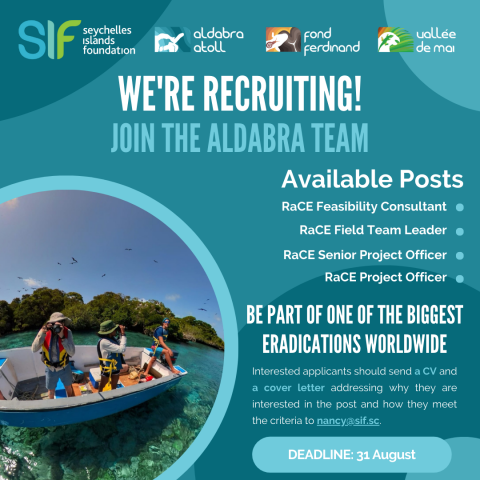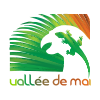
Background
The following positions form a project team that will be responsible for the Aldabra Atoll UNESCO World Heritage Site rat and cat eradication (RaCE) feasibility phase. In 2022, SIF announced its intention to start planning an eradication of rats and cats from the atoll. The Aldabra eradication would be the third largest tropical island for rats and the largest eradication in mangrove forests. The first step towards an eradication is a world-class feasibility study, including extensive on-site trials. The RaCE team will be integrated within the existing small research team based on Aldabra and spend two years on the atoll to complete the work. By the end of the two years we aim to have collected all the information needed to confirm whether an eradication is feasible and how it can be achieved, considering the complexities of the terrain and Aldabra’s flora and fauna.
Overview of work involved
- The team of four will be based at the Aldabra research station (on Picard Island) but will travel and camp extensively around the atoll to conduct field trials and monitoring on all four of the main islands. The team will have the following aims (detailed workplan is under development):
- Assess density of rats in different habitats and at different times of year
- Determine how much bait is needed to ensure all rats in different habitats consume a lethal dose
- Confirm which species (other than rats) consume bait
- Determine how much bait is consumed by non-targets
- Assess how bait affects non-target species that consume it directly and indirectly
- Support research and development to identify a method to deploy bait successfully in large areas of mangrove habitat
- Understand how target species use areas such as tidal flats or limestone tunnel networks
- Support and assist with other ecological monitoring
These aims will inform the eradication operational and costing plans and identify where we need to develop non-target species management plans to mitigate impacts of the bait. The work will involve trapping, mark and recapture studies, remote camera trapping, small-scale toxic and non-toxic bait deployment trials of captive animals, target species culling and dissections, environmental sampling and ecological monitoring.
The Aldabra terrain is challenging, the climate is hot and there is no easy or quick route to medical facilities; however, the teams on Aldabra operate within safe working guidelines and follow a set of standard operating procedures which ensures fieldwork is conducted safely. While based at the research station there is internet, work offices, running water and electricity and each team member will have a shared room within the accommodation block as their base. Camps have none of these facilities and in some areas, water and camping gear will need to be carried to the field site. The team is expected to spend approx 50/50 time at station/camp.
The below posts are being advertised:
- RaCE Feasibility Consultant
- RaCE Field Team Leader
- RaCE Senior Project Officer
- RaCE Project Officer (x 2)
Interested applicants should send a CV and a cover letter addressing why they are interested in the post and how they meet the criteria to nancy@sif.sc. Apply before 31st August 2023, late applicants will only be considered if the position is not filled.






